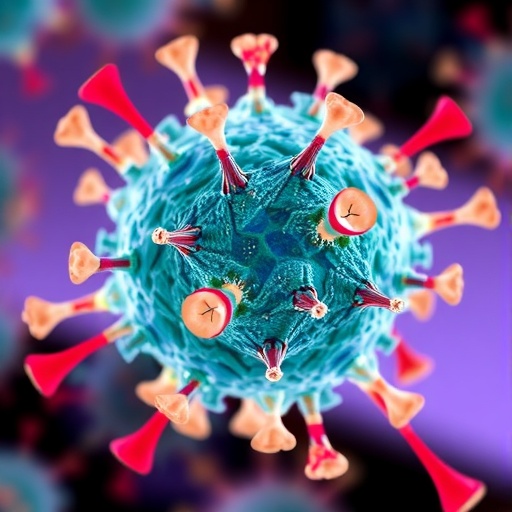As the field of cancer treatment continues to evolve, T-cell receptor (TCR) therapy has emerged as a beacon of hope in the fight against various cancers, particularly ovarian cancer. This innovative approach harnesses the power of the immune system to specifically target and eliminate cancer cells. Recent studies, including one spearheaded by Wang et al., have delved into the complexities surrounding TCR therapy’s application in ovarian cancer, illuminating both its potential and the challenges that lie ahead.
Ovarian cancer remains one of the most formidable adversaries in oncology, largely due to its late-stage diagnosis and the intricacies involved in its treatment. Conventional therapies like chemotherapy and radiation, while effective to some extent, often fail to provide the sustained response necessary for long-term remission. TCR therapy presents a novel alternative by allowing for a more personalized treatment approach. It involves the genetic engineering of T cells to express specific receptors that can identify and bind to tumor-associated antigens present on the surface of ovarian cancer cells.
The essence of T-cell receptor therapy lies in its specificity. Unlike traditional treatments that indiscriminately target both cancerous and healthy cells, TCR therapy is designed to precisely hone in on cancer cells. This specificity not only enhances the effectiveness of the treatment but also significantly reduces the collateral damage to normal cells, which is often the hallmark of conventional cancer treatments. This is particularly crucial in ovarian cancer, where preserving the quality of life during treatment is paramount.
Central to the advancement of TCR therapy is the identification of suitable tumor antigens. Wang and colleagues have highlighted the significance of tumor-associated antigens, which are proteins or molecules expressed abnormally in cancer cells compared to normal cells. The successful identification and characterization of these antigens is essential for developing effective TCR therapies. Once these antigens are pinpointed, T cells can be engineered to express receptors that specifically recognize and attack ovarian cancer cells.
Despite the promising outlook of TCR therapy, several challenges persist that must be addressed for its widespread implementation in clinical settings. One major hurdle is the tumor microenvironment. Ovarian tumors often create an immunosuppressive environment that can inhibit the function of infused T cells. This poses a significant challenge as it may diminish the efficacy of TCR therapies, leading to inadequate responses in patients. Understanding and manipulating the tumor microenvironment may thus provide vital insights into enhancing the effectiveness of T-cell therapy.
Another critical challenge lies in the variability of patient responses to TCR therapy. Not all patients exhibit the same immune response to treatment, which can be attributed to genetic differences and variations in tumor biology. This heterogeneity necessitates a more personalized approach in selecting candidates for TCR therapy, as well as tailoring the treatment to better suit individual patient profiles. Ongoing research is focused on elucidating the factors that contribute to these differences, which will be pivotal for optimizing therapeutic efficacy.
Moreover, the technical aspects of TCR therapy, such as the method of T-cell extraction and genetic modification, pose additional complexities. The process involves isolating T cells from a patient’s blood, engineering them to express the desired TCRs, and then infusing these modified T cells back into the patient. Each step must be meticulously executed to ensure the highest quality and viability of T cells, which can be labor-intensive and costly.
As with many emerging therapies, safety remains a paramount concern in the application of TCR therapy. The potential for adverse effects, such as cytokine release syndrome or off-target effects where T cells attack healthy cells, must be carefully monitored. Researchers are actively working on developing strategies to mitigate these risks, ensuring that the benefits of TCR therapy outweigh the potential drawbacks.
The future of TCR therapy in ovarian cancer looks promising, particularly with the advancements in genomic technologies and our understanding of cancer biology. The ability to sequence genomes and identify tumor mutations has revolutionized the stage for personalized medicine. As researchers like Wang et al. continue to pave the way for TCR therapy, they contribute significant knowledge that could potentially reshape the treatment landscape for ovarian cancer patients.
Collaboration among scientists, clinicians, and regulatory bodies will be crucial in overcoming the hurdles that TCR therapy faces. Multi-disciplinary approaches combining immunology, molecular biology, and clinical expertise will be essential in refining techniques and broadening patient access. This collective effort will hopefully lead to breakthroughs that not only improve response rates but also extend survival and enhance the quality of life for patients grappling with ovarian cancer.
Ultimately, the success of TCR therapy will hinge on a comprehensive understanding of both its biological framework and the specific characteristics of the tumors it aims to treat. Continuous research and innovation will be vital in unlocking the full potential of this therapy, paving the way for it to become a standard treatment option for ovarian cancer.
In conclusion, T-cell receptor therapy stands at the forefront of cancer immunotherapy, representing a transformative approach in the management of ovarian cancer. With ongoing research efforts to tackle the inherent challenges, the hope remains that this promising therapy will soon provide a viable and effective option for patients who desperately need new avenues of treatment.
Subject of Research: T-cell receptor therapy in ovarian cancer
Article Title: T-cell receptor therapy in ovarian cancer: concepts and challenges
Article References: Wang, X., Li, Z., Zhang, M. et al. T-cell receptor therapy in ovarian cancer: concepts and challenges. J Ovarian Res 18, 256 (2025). https://doi.org/10.1186/s13048-025-01831-y
Image Credits: AI Generated
DOI: https://doi.org/10.1186/s13048-025-01831-y
Keywords: T-cell receptor therapy, ovarian cancer, immunotherapy, tumor microenvironment, personalized medicine




